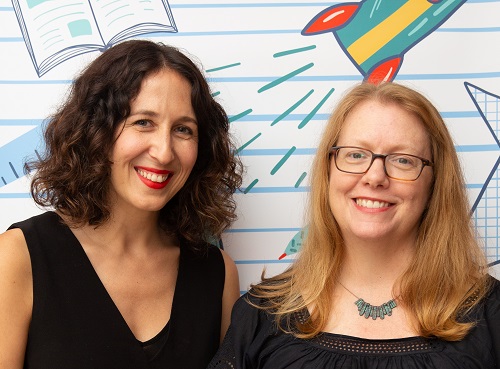Professional Development for Caregivers | First Steps
Libraries offer a range of career support programs for childcare providers.
 |
Denise Laird, Storytime Express outreach librarian at Carroll County (MD) Public Library (CCLP), at a child are center; an impromptu puppet show at CCLP's Mount Airy branch.Photo courtesy of Carroll County (MD) Public Library; photo by Stephanie Zinger |
When New York Public Library (NYPL) launched Nanny-Meetups, informal programs offering childcare providers early literacy information and ideas for playful enrichment, it forged a connection with a group that uses libraries every day. “I see more caregivers using the songs and fingerplays I’ve taught them, and increased storytime participation,” says Grace Zell, children’s librarian at NYPL’s 53rd Street Library. “I hope that this sort of behavior extends outside the library.”
More libraries are offering initiatives to help a range of providers build early literacy teaching skills. That’s a boon for many of the 12.6 million children under six in childcare, where they spend an average of 33 hours weekly. By 2021, there will be an estimated 856,238 U.S. day care operators, though that number is only part of the story. Children can be found in myriad childcare settings, which makes library outreach complex—and rewarding.
It’s worth researching childcare options in your community, and what they’re called, to best serve them. Some municipalities offer subsidies for low-income families who pay a family member, friend, or neighbor for care. These providers, who are “legally exempt” caregivers, often receive little training. Providers licensed to care for children in their home are called family childcare providers. Center-based care can serve large numbers of children and has the most stringent licensing requirements. Then there are privately employed nannies and sitters.
Brooklyn Public Library (BPL) designed the professional development program Nanny & Me in Spring 2019. During four workshops, we teach and model early literacy practices and brain-building activities for children ages zero to three, culminating in a certificate caregivers can share with employers. Christina Ferrari, the BPL children’s librarian who piloted the program at Bedford Library, says it’s a welcoming, safe space where caregivers can share experiences, offer support, and socialize. Attendees felt more confident choosing age-appropriate books and increased library program attendance, she adds.
Mary Kuehner, early literacy outreach librarian at Arapahoe (CO) Libraries, offers Learning on the Go for home-based providers. It’s a storytime program with additional learning activities, resources, and free books. The Washington County (OR) Cooperative Library Services has an annual training symposium for legally exempt providers in partnership with school districts and agencies that serve providers. It is “a key activity for training the childcare providers who need it the most,” says youth services librarian Katie Anderson, as this population is often isolated.
Other initiatives bring staff and materials to home- and center-based programs. Carroll County (MD) Public Library has offered the Storytime Express mobile service since 1975, delivering books, resource kits, and skills training. The Free Library of Philadelphia’s Literacy in Early Learning Spaces builds relationships between childcare programs and libraries, with extensive training in early literacy and language development. There are professional development sessions, in-class coaching with specialists, family engagement events, and reading corners with high-quality, age-appropriate books.
At BPL, we also offer deep career support. Growing Providers, launched in 2017 and funded by the Institute of Museum and Library Services, is a free, 13-week training session to help individuals become licensed family childcare providers. A collaboration with BPL’s Business and Career Center and early childhood partners, Growing Providers offers sessions on early childhood development, literacy, and small business development, as well as required health and safety sessions.
“The greatest impact has been bringing together a culturally diverse group of participants to establish a bond and support each other,” says program coordinator Cynthia Pearson. “As an immigrant living in this country for five years, this is the first time anyone has accepted me in a group,” one participant noted. “I learned how to better care for my child and other people’s children, too.”
Rachel G. Payne is coordinator of early childhood services at Brooklyn Public Library. Jessica Ralli is BPL’s coordinator of early literacy programs.

RELATED
The job outlook in 2030: Librarians will be in demand
The job outlook in 2030: Librarians will be in demand
ALREADY A SUBSCRIBER? LOG IN
We are currently offering this content for free. Sign up now to activate your personal profile, where you can save articles for future viewing





Add Comment :-
Be the first reader to comment.
Comment Policy:
Comment should not be empty !!!